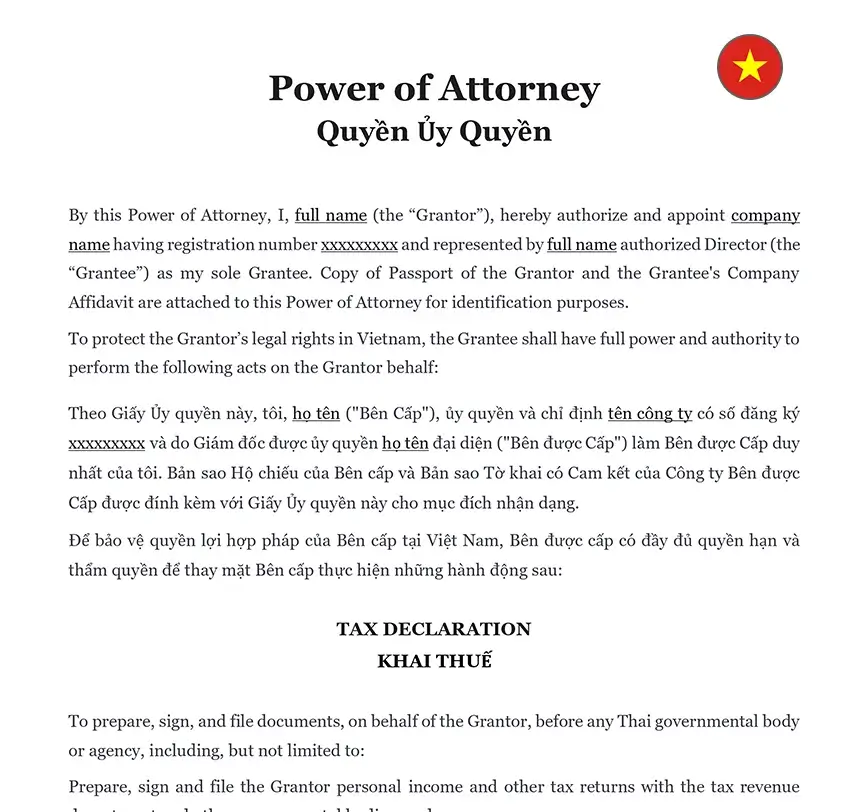Ready to use legal template
Drafted by experienced lawyers
Vietnamese-English translation
Ready to use legal template
Drafted by lawyers
Vietnamese-English translation
Home › Business contracts › Power of attorney
Learn more about Power of Attorney in Vietnam
A Power of Attorney (POA) is a legal document that allows an individual (the principal) to authorize another person to act on their behalf in legal, financial, or personal matters. In Vietnam, a POA is widely used for various purposes such as signing contracts, managing property, handling banking transactions, or representing someone in legal or government procedures, especially when the principal is overseas or otherwise unavailable. For a POA to be valid in Vietnam, it must meet specific legal requirements, including notarization or authentication depending on its use. Having a properly drafted POA ensures clarity, reduces the risk of misuse, and protects the interests of all parties involved. At Themis Partner, we offer a professionally drafted Power of Attorney template, easy to edit in Word format, and available in both English and Vietnamese.
Table of contents
What is a Power of Attorney?
What is included in a Power of Attorney?
Why would I need a Power of Attorney in Vietnam?
What types of Power of Attorney are there?
How should a Power of Attorney be executed to be valid?
What are the responsibilities of an attorney-in-fact?
How do I revoke a Power of Attorney in Vietnam?
Can I have more than one Power of Attorney in Vietnam?
Are there any limitations to what an attorney-in-fact can do?
What is a Power of Attorney?
A Power of Attorney (POA) is a crucial legal document that empowers an individual (the “principal”) to designate another person or organization (the “attorney-in-fact” or “agent”) to act on their behalf in a wide range of legal, financial, or medical matters. By granting this authority, the principal ensures that their personal and financial affairs are managed according to their wishes, even if they become unavailable, incapacitated, or otherwise unable to handle these matters themselves.
The attorney-in-fact is vested with the authority to make decisions and take actions as outlined in the Power of Attorney document. This can include managing bank accounts, signing checks, selling property, making investment decisions, filing taxes, and making healthcare decisions, among other responsibilities. The scope of the agent’s authority can be broad or limited, depending on the specific terms set forth in the POA.
A Power of Attorney is invaluable in numerous situations. For instance, it can provide peace of mind to those who travel frequently, ensuring their affairs are managed in their absence. It is also essential for elderly individuals or those with declining health, allowing a trusted person to make critical healthcare and financial decisions on their behalf. Additionally, it is a fundamental tool for business owners who may need someone to manage their business operations temporarily.
What is included in a Power of Attorney?
A Power of Attorney (POA) typically includes the following elements:
1. Identification of Parties:
The document should clearly identify the principal (the person granting the power) and the attorney-in-fact (the person receiving the power).
2. Scope of Authority:
It specifies the powers and responsibilities granted to the attorney-in-fact, such as managing finances, making healthcare decisions, or handling legal matters.
3. Duration:
The document should specify whether the power of attorney is durable (remains in effect even if the principal becomes incapacitated) or limited to a specific time period.
4. Revocation:
It should outline the process for revoking or terminating the power of attorney.
5. Notarization:
Depending on local laws, the document may need to be notarized to be valid.
6. Specific Instructions:
Any specific instructions or limitations on the attorney-in-fact’s powers should be clearly outlined.
7. Acknowledgment of Responsibilities:
The attorney-in-fact may be required to acknowledge their responsibilities and duties under the power of attorney.
It’s important to carefully consider the terms and provisions of a Power of Attorney and to consult with legal counsel to ensure that the document meets the specific needs and circumstances of the principal.
Why would I need a Power of Attorney in Vietnam?
A Power of Attorney (POA) can be essential for several reasons:
1. Incapacity Planning
It allows you to plan for the possibility of becoming incapacitated due to illness, injury, or old age. With a POA in place, you can designate someone to manage your affairs and make decisions on your behalf if you are unable to do so yourself.
2. Convenience
Even if you are not incapacitated, a POA can be convenient for managing your affairs, especially if you travel frequently or are otherwise unavailable to handle certain matters.
3. Financial Management
A POA can be used to authorize someone to manage your finances, pay bills, and make financial decisions on your behalf.
4. Healthcare Decisions
A POA for healthcare (also known as a healthcare proxy or medical power of attorney) allows you to designate someone to make medical decisions for you if you are unable to do so.
5. Legal Representation
A POA can authorize someone to act as your legal representative, such as signing legal documents on your behalf or representing you in legal proceedings.
6. Real Estate Transactions
If you are buying or selling property and cannot be present to sign the necessary documents, a POA can allow someone to sign on your behalf.
7. Business Matters
For business owners, a POA can be useful for delegating authority to manage business affairs in your absence.
In essence, a Power of Attorney provides a legal mechanism to ensure that your affairs are managed according to your wishes, even if you are unable to manage them yourself. It offers peace of mind and security, knowing that someone you trust is empowered to act on your behalf when needed.
What types of Power of Attorney are there?
There are several types of Power of Attorney (POA), each serving a different purpose and providing varying levels of authority to the designated agent. Here are some common types of POA:
General Power of Attorney: This type of POA grants broad powers to the agent to act on behalf of the principal in a variety of matters, including financial transactions, real estate transactions, and legal matters. It is often used for temporary situations or when the principal is unable to handle their affairs due to travel or illness.
Limited (Special) Power of Attorney: A limited POA grants the agent specific powers and limits their authority to a particular transaction or type of transaction. For example, a limited POA may be used to authorize someone to sell a specific piece of property on behalf of the principal.
Durable Power of Attorney: A durable POA remains in effect even if the principal becomes incapacitated. This type of POA is useful for incapacity planning, ensuring that someone is authorized to manage the principal’s affairs if they are unable to do so themselves.
Springing Power of Attorney: A springing POA becomes effective only under certain conditions, typically when the principal becomes incapacitated. This type of POA can be useful for incapacity planning but may require specific criteria to be met before it takes effect.
Healthcare Power of Attorney (Healthcare Proxy): This type of POA authorizes someone to make healthcare decisions on behalf of the principal if they are unable to do so. It is an essential part of advance healthcare planning.
Financial Power of Attorney: A financial POA grants the agent authority to make financial decisions and manage financial affairs on behalf of the principal. This can include paying bills, managing investments, and other financial transactions.
Real Estate Power of Attorney: This type of POA authorizes someone to handle real estate transactions on behalf of the principal, such as buying, selling, or managing property.
It’s essential to consider your specific needs and circumstances when choosing a type of Power of Attorney and to consult with a legal professional to ensure that the document meets your requirements and complies with the law.
How should a Power of Attorney be executed to be valid?
To be valid, a Power of Attorney (POA) must be executed in accordance with the laws of the jurisdiction where it is being used. However, there are some general guidelines that apply in most jurisdictions:
| ➤ Capacity: The principal must have the legal capacity to grant a POA, meaning they must be of sound mind and understand the nature and consequences of the document they are signing. |
| ➤ Intent: The principal must sign the POA voluntarily and with the intent for it to be legally binding. |
| ➤ In writing: In most jurisdictions, a POA must be in writing to be valid, although some states may recognize oral POAs in limited circumstances. |
| ➤ Signature: The POA must be signed by the principal. Some jurisdictions require the signature to be witnessed or notarized. |
| ➤ Agent's acceptance: The agent (attorney-in-fact) should also sign the POA to indicate their acceptance of the appointment. |
| ➤ Specificity: The POA should clearly specify the powers granted to the agent, as well as any limitations or conditions. |
| ➤ Revocation: The POA should include provisions for revocation, specifying how and when the document can be revoked. |
| ➤ Notarization: Depending on the jurisdiction, the POA may need to be notarized to be valid. This typically involves the principal and the agent signing the document in the presence of a notary public, who then verifies their identities and witnesses their signatures. |
| ➤ Recording: In some cases, the POA may need to be recorded or filed with a government agency to be effective for certain purposes, such as real estate transactions. |




